BLOGBUSTERS The Best Of Enemies
The SFX Blogbuster team members choose their favourite hero/villain rivalries
The only relationship as intimate for a hero other than the love of their life is the one they share with their nemesis. Every good protagonist has one; the person who opposes them at every turn, the yin to their yang, the Monarch to their Doctor Venture, the monobrow kid to their Maggie Simpson. But which of these delicately-balanced, good vs evil dances of death are the best. Come with us, dear reader, on a journey through time and space, as the SFX bloggers answer this week's question:
Who represents the best hero/arch-nemesis dynamic?
Go team Venture! Or in the absence of Team Venture! Team Blogbusters!
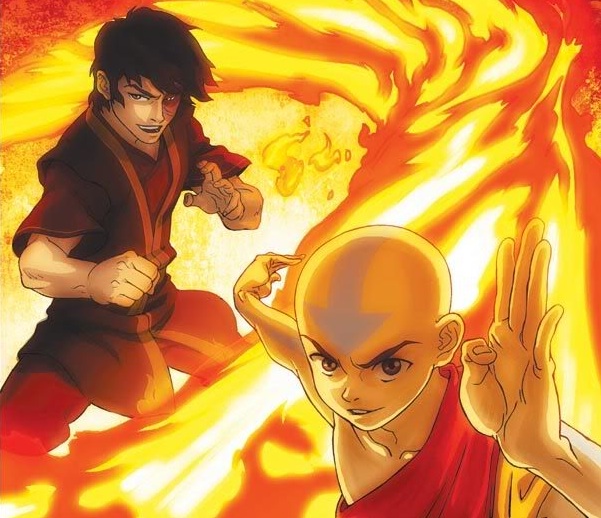
PigMonkey: While Joker is my favorite villain of all time, I would have to say one of my favorite rivalries between hero and villain has to be the Aang and Prince Zuko in the first two and a half seasons of Avatar . Zuko, while having access to only the fire element, is more than an match for Aang. Zuko is smart, but angry and single-minded, everything that Aang the avatar is not. Zuko relentlessly pursues the Avatar to earn the right to return home.
As a bad guy you feel for him even though he is making bad decisions worse. There is a great completion to the story when Zuko finally after years of pursuit, and schemes to capture the Avatar, joins them in order to teach Aang the art of fire bending. It is a great story arc and an amazing culmination of the journey of two people whose destinies are intertwined.
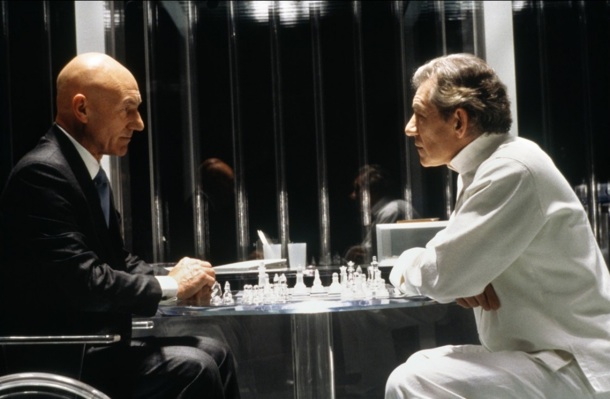
Matt Risley: I know I'm becoming a Buffy obsessive, but I'm tempted to say Angelus and Buffy. When Angel went Big Bad, he became the ultimate nightmare – I've never seen a nemesis who could hit as hard emotionally as he did physically. Sure, the punches to the face and regular fight scenes provided ample action, but it was the cruel way in which he delighted in twisting the screw (targeting friends, family and Buffy's confused emotional state) that truly devastated.
That being said, a truly great good/bad guy dynamic has to have something more than mere flashy fisticuffs. Which is why I'm going for Magneto vs Xavier – a classic rivalry and complex dynamic that's evolved with every comics and movie incarnation.
Sign up to the SFX Newsletter
Get sneak previews, exclusive competitions and details of special events each month!
From the character and power design to their ideological differences, they're a duo that's always riveting to see spark off each other; even better, while it's easy to write Erik as a “crazy megalomaniacal loony toon”, it's when his argument (if not his methods) make some kind of sense that the rivalry, erm, magnetises.
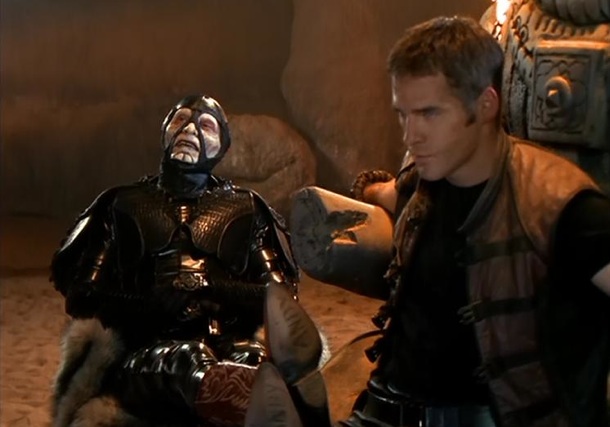
Steven Ellis: I'm not a fan of having regular villains. I think they invariably become over-used and that often means their threat becomes lessened. If a villain is popular then the urge is to keep bringing them back and that never really rings true for me, and in the case of the Marvel/DC lot I'd start to question how these villains haven't been caught, sentenced to death and executed after their many failed schemes. I find it hard to believe any populace would stand for round after round of devastating superhero battles with no end in sight.
I guess that's the Dredd fan in me. With very few exceptions all the villains Dredd tackles die after the first encounter.
There is however, one stand-out long-running baddie for me and he’s from the same TV show I singled out last week. The show is Farscape. That villain is Scorpius and his relationship with the main hero was brilliant and very, very complex.
Scorpius was introduced towards the end of season one and swiftly became the main antagonist for the rest of the show's run. The gimp-suited character was perfect for the bat's-arse Farscape universe. An experimental hybrid possessed of a cunning, brutal and patient intellect, Scorpius was willing to try anything to achieve his goals and was always a character to be reckoned with.
The thing that makes the character stand out for me is the way he was used. The makers of the show realised they had a winning character and they obviously realised they could risk over-using him, so they came up with Harvey.
Harvey (named by character John Crichton after “Harvey” the imaginary rabbit from the 1944 play and later James Stewart-starring film of the same name), was a neural clone of Scorpius introduced in season two and was a personality presence implanted in the mind of hero John Crichton to unlock the secrets hidden there. It was a brilliant way to keep the bad guy regularly in the show but avoid countless unresolved run-ins. The Harvey neural clone version of Scorpius was able to interact with Crichton in a way that gave them time to fight but it didn't have to be resolved because it’s really John fighting with John. Harvey became an alter-ego; sometimes helpful, sometimes not, sometimes going so far as to take command of Crichton’s body, but always trying to unlock the secrets he was after.
When this task was completed it was discovered that Crichton couldn't get rid of his Harvey alter-ego and an uneasy truce was formed. But this still meant that as well as the real Scorpius out in the universe to bump into from time to time, there was also a version closer to hand and who was easily justified in appearing at any time.
The banter between Crichton and Harvey and Crichton and Scorpius was always fantastic; sometimes serious, sometimes comedic, but always gripping and unique. It was like having two villains for the price of one, each with differing personalities and each with a different relationship with Crichton. It's a great dual use of one of the stand out villains in sci-fi TV and Scorpius and Harvey never outstayed their welcome.
Through the four-part saga Nick has to solve the sinister and elaborate real life games set by Magnus, receiving VHS tapes with recorded messages from his nemesis, sitting in high-backed wooden chair in a manor house with two evil-looking dogs. There are allegories to Merlin and Arthur, motorbike jousting and a shoot-out in a fake street. It's a great story of rivalry and revenge, both leads playing wonderfully flawed characters, an egotistical businessman made vulnerable versus a super intelligent games designer gone mad. It's hard to get on DVD, but you can find it hidden in the corners of that there YouTube and it has a great theme tune too.
Nebulous (played to perfection by Mark Gatiss) has faced many foes in the three series that have aired, but none so brilliant – nor as recurring – as Doctor Joseph Klench.
Klench is the Master to Nebulous’ Doctor, the Blofeld to his Bond, the Greenback to his Dangermouse.
Klench appears in five episodes of Nebulous . He is evil incarnate. Like the Master, he has been known to miniaturise his enemies, but he carries them around in a suitcase to remind himself of his power (as Nebulous says: it’s always the little people who get hurt). Klench is the anti-Nebulous, as self-serving as Nebulous is honourable. Klench’s attempts to take over or destroy the earth are ever-thwarted by our hero, who once accidentally blew up the Isle of Wight when trying to move it slightly to the left to give it more sun.
We first meet Klench in the episode “Night Of The Vegetarians”, in which the villain has colluded with a super-intelligent intergalactic cactus which has the power to brainwash and enthrall its victims. It’s sillier than it sounds.
Klench’s schemes have so far all be thwarted by Nebulous, but often by luck as much as judgement. One day, however, one day…
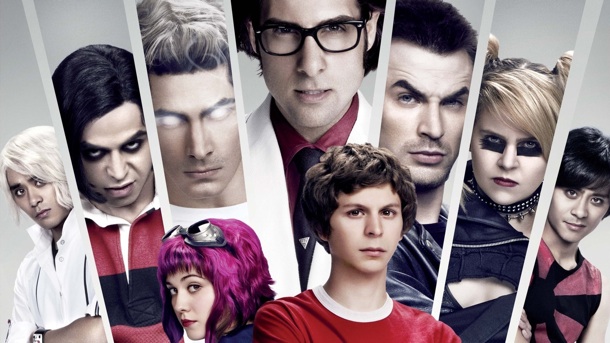
Kell Harker: Best hero/villain rivalry? Scott Pilgrim versus the League Of Evil Exes, obviously! Someone has to make those exes pay for their crimes against humanity, and Scott Pilgrim is the perfect geek hero with the cool t-shirts who's headbutting his way into the heart of his dream girl. Normally the hero is lucky and has just one nemesis, but Scott has an annoying league of them with the "big boss" Gideon at the end. Unfair! But even with all that baggage, Ramona Flowers is worth it. Even if he did have to punch a girl in the boob. Hey it could have been worse, there could have been 11 evil exes.
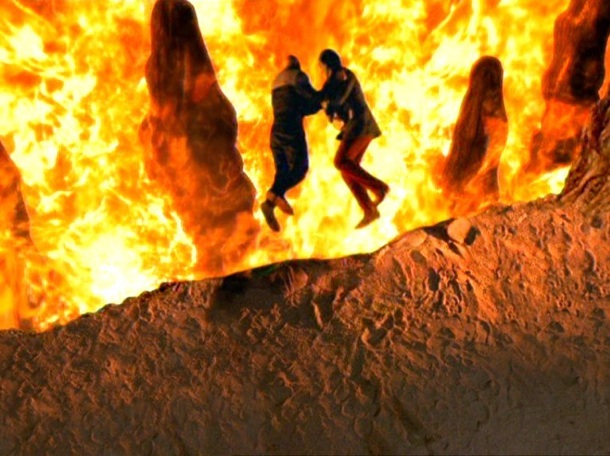
Troo Topham: For me it's got to be Captain Sisko and Gul Dukat, with a side order of Kai Winn. Can I get away with having a Nemesis pair? A tag-team? Winn had the used-car-salesman brand of evil, and Dukat went from patient to psycho evil, but both in this pair utterly believed that they were the good guys. And sometimes they might've been almost right – Sisko was certainly willing to get his hands dirty to uphold his side of the fight. With both sides capable of tremendous intelligence, tactical forethought, and political maneuvering it was a fight which ultimately claimed the lives of all three parties. Sisko just got lucky (if you call becoming a Prophet "lucky") with the whole death deal.
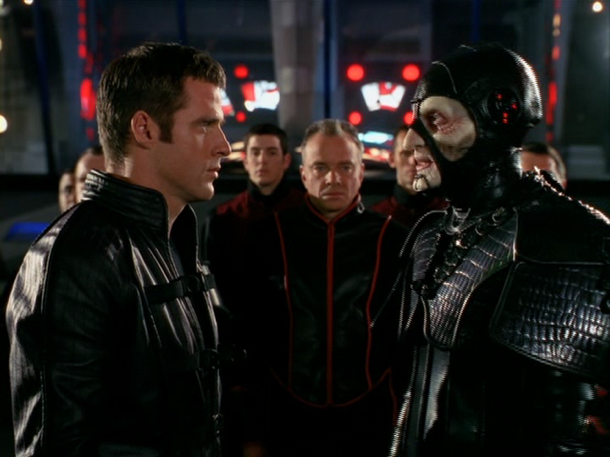
Will Salmon: There are some great nemeses in SF, but the pair that sticks in my mind is Crichton and Scorpius from Farscape . Scorpy was a great villain from the off, but when he implanted a part of himself in Crichton's mind, it became an epic rivalry. Sure, it was a shameless excuse to get a fan favourite character in every episode, but it worked. There was a real sense that poor John was losing his mind. Then, as the series reached its climax, you started to get extra layers of characterisation. Scorpius was still a massive murderous dick... but you began to see that he is, perhaps, the lesser of several evils. Great characters and a great show.
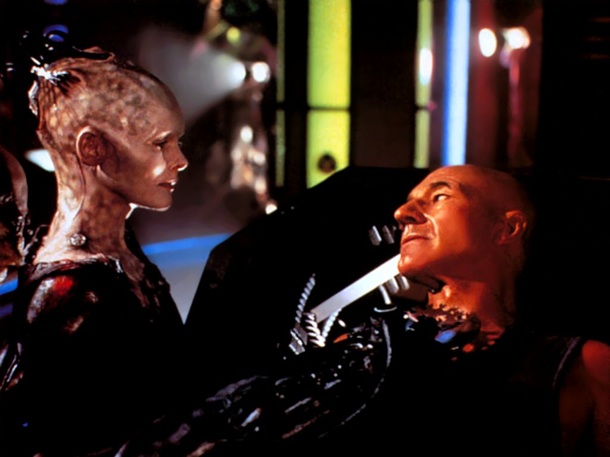
Laura McConnell: My list of candidates for this answer is long. Favorites like Cassanova Frankenstein, Captain Hammer, and General Chang didn't quite cut it. Among the greats, family ties were a common theme, but in the end, I had to pick a villain who did so much worse than violate a son's or a brother's trust. So Cigarette-Smoking Man, Darth Vader and Thor were out. Instead, I'm picking The Borg versus Jean-Luc Picard. No other foe did so much damage to its prey (with the debatable exception of my penultimate finalist, Scorpius and John Crichton, and my honorable mention, Steve the Wraith and John Sheppard) and yet had that prey live to fight another day.
The Borg not only captured Picard – they robbed him of his humanity. They forced him to injure, kill, and destroy in their name. They even altered his body. But in the end, he triumphed. He was damaged, and that damage is what made him human again for us viewers. His righteous anger and cold-blooded decision-making in First Contact were justified, and that made for quality story-telling.
And so my line is drawn there.
And if we can't end on the wisdom of Jean Luc Picard, what can we end on? Thanks to the Blogbusters for their fine work as ever and next week, in the light of DC Warner's ongoing frantic scrabble to make something other than the Nolan Batman and Zack Snyder Superman movies happen, we're asking:
In the light of Warners apparently sussing out Ben Affleck’s interest in directing a Justice League movie (which, apparently amounted to little more than a vague suggestion and polite no) who do the Blogbusters think should direct it?
See you in seven…


